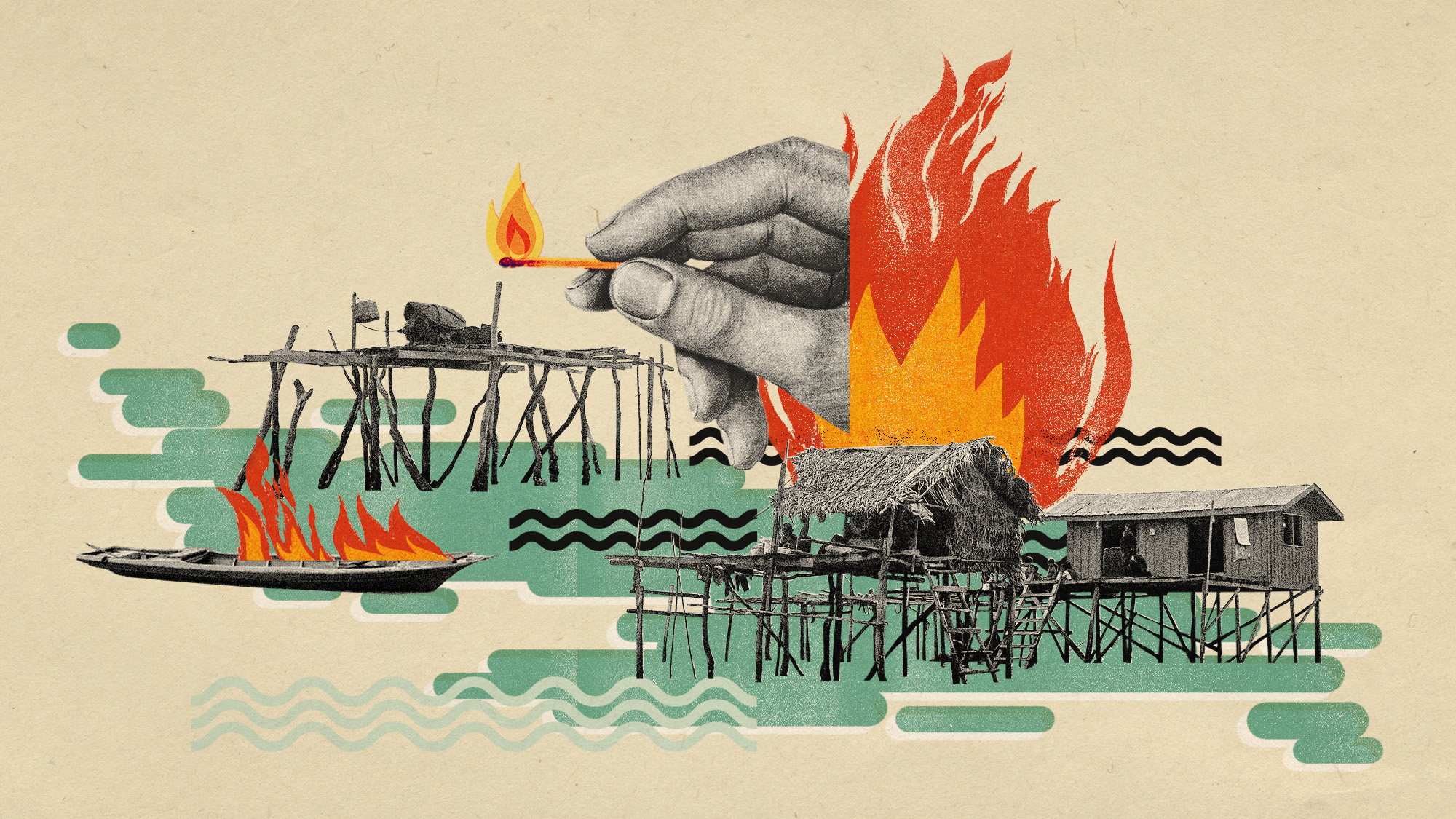The campaign of destruction against 'sea gypsies'
Malaysia targets traditional seafaring Bajau Laut tribe in crackdown on undocumented migrants

A free daily email with the biggest news stories of the day – and the best features from TheWeek.com
You are now subscribed
Your newsletter sign-up was successful
Malaysian police have been demolishing the offshore homes of a nomadic maritime tribe, with hundreds evicted as part of a crackdown on undocumented migrants.
Famous for their free-diving skills, the Bajau Laut ("sea gypsies") live on houseboats and huts on stilts, in the shallow Sulu Sea off Borneo. But as many do not register their births, they cannot attend school or access social services. The often "poor and uneducated" stateless group are "discriminated against" by other ethnic groups in Sabah, the Malaysian state that comprises northern Borneo, said The Times.
Last month more than 500 Bajau people were evicted in what local activists called a "government crackdown on undocumented migrants", said Reuters. Officials have been "burning and demolishing" Bajau homes on seven islands, according to a Sabah-based campaign group. The Bajau "often live in fear" of authorities, who "do not make a distinction between stateless residents and undocumented migrants".
The Week
Escape your echo chamber. Get the facts behind the news, plus analysis from multiple perspectives.

Sign up for The Week's Free Newsletters
From our morning news briefing to a weekly Good News Newsletter, get the best of The Week delivered directly to your inbox.
From our morning news briefing to a weekly Good News Newsletter, get the best of The Week delivered directly to your inbox.
A traditional, self-sufficient life
The Bajau people have been "crisscrossing the waters of the Sulu Sea for centuries", said The Guardian.
They were first mentioned in 1521 by the Venetian explorer Antonio Pigafetta, who went on the first voyage to circumnavigate the Earth, and are believed to be the world's only community of "self-sufficient sea nomads".
The nomadic tribe "never settles on land", said The Sun. They live on houseboats and collect shellfish from the sea floor, but also differ in more physical ways from their land-bound peers. The "fish people" have evolved to have bigger spleens, which act like a "scuba tank" and store oxygen, allowing the Bajau to stay underwater for up to 10 minutes at a time. They can also dive down to 200 feet, like a "real-life Aquaman".
"The spleen is a reservoir for oxygenated red blood cells, so when it contracts, it gives you an oxygen boost," Melissa Ilardo, from the University of Copenhagen, told the BBC in 2018. "When they're diving in the traditional way, they dive repeatedly for about eight hours a day, spending about 60% of their time underwater." These deep dives are performed with "only a wooden mask or goggles and a weight belt", said the broadcaster.
A free daily email with the biggest news stories of the day – and the best features from TheWeek.com
Scientists found that both divers and non-divers of the community had similar-sized spleens, about 50% larger than normal, which implies that it is genetic: a product of evolution rather than a consequence of diving.
Crackdown on stateless people
Life for the Bajau "became more complex in the colonial era", said The Guardian. Malaysia, the Philippines and Indonesia created maritime borders in the Sulu, as part of the Madrid protocol of 1885, "without bothering to consider the distribution and diversity of the ethnic groups who lived there".
But it was the Malaysian Immigration Act of 1959 that "most significantly changed things" for the Bajau. The law "failed to distinguish between asylum seekers, refugees, irregular migrants and undocumented or stateless individuals".
The Bajau "were in a precarious legal situation". Many were forced to settle near Borneo, where they have "grappled with Malaysia's bureaucratic processes ever since".
Today, many in the tribe have no legal documents and are "deprived of government privileges", said The Sun. "Once self-sufficient, the tribe finds itself in poverty when they set foot ashore."
In recent years, Malaysia has "stepped up enforcement against illegal migration", said Reuters, detaining an estimated 45,000 undocumented people since 2020, according to Human Rights Watch in March.
Last month hundreds of Bajau stilt homes in a Malaysian marine park on Borneo were demolished, said The Associated Press. The state "defended its move to tear down the unauthorised settlements", saying the aim was to bolster security and that eviction notices had been sent. But the Bajau said they have been "left homeless".
An activist documenting the attacks on the group's behalf was arrested last week under a sedition law of 1948, created by the British colonial government. Mukmin Nantang's videos showing men in plain clothes "pulling down" Bajau homes, which were later "set on fire", have "embarrassed the local authorities", said The Times.
"Their way of life has been encroached upon for a long time. They were forced to move to the land," said Mukmin. "Now, their lives are being destroyed again, and they are not provided with alternative shelters. Where are they supposed to go?"
Harriet Marsden is a senior staff writer and podcast panellist for The Week, covering world news and writing the weekly Global Digest newsletter. Before joining the site in 2023, she was a freelance journalist for seven years, working for The Guardian, The Times and The Independent among others, and regularly appearing on radio shows. In 2021, she was awarded the “journalist-at-large” fellowship by the Local Trust charity, and spent a year travelling independently to some of England’s most deprived areas to write about community activism. She has a master’s in international journalism from City University, and has also worked in Bolivia, Colombia and Spain.
-
 The week’s best photos
The week’s best photosIn Pictures An explosive meal, a carnival of joy, and more
-
 The ‘ravenous’ demand for Cornish minerals
The ‘ravenous’ demand for Cornish mineralsUnder the Radar Growing need for critical minerals to power tech has intensified ‘appetite’ for lithium, which could be a ‘huge boon’ for local economy
-
 Why are election experts taking Trump’s midterm threats seriously?
Why are election experts taking Trump’s midterm threats seriously?IN THE SPOTLIGHT As the president muses about polling place deployments and a centralized electoral system aimed at one-party control, lawmakers are taking this administration at its word
-
 Vietnam’s ‘balancing act’ with the US, China and Europe
Vietnam’s ‘balancing act’ with the US, China and EuropeIn the Spotlight Despite decades of ‘steadily improving relations’, Hanoi is still ‘deeply suspicious’ of the US as it tries to ‘diversify’ its options
-
 The ‘mad king’: has Trump finally lost it?
The ‘mad king’: has Trump finally lost it?Talking Point Rambling speeches, wind turbine obsession, and an ‘unhinged’ letter to Norway’s prime minister have caused concern whether the rest of his term is ‘sustainable’
-
 Does standing up to Trump help world leaders at home?
Does standing up to Trump help world leaders at home?Today’s Big Question Mark Carney’s approval ratings have ‘soared to new highs’ following his Davos speech but other world leaders may not benefit in the same way
-
 Le Pen back in the dock: the trial that’s shaking France
Le Pen back in the dock: the trial that’s shaking FranceIn the Spotlight Appealing her four-year conviction for embezzlement, the Rassemblement National leader faces an uncertain political future, whatever the result
-
 ‘It may portend something more ominous’
‘It may portend something more ominous’Instant Opinion Opinion, comment and editorials of the day
-
 EU-Mercosur mega trade deal: 25 years in the making
EU-Mercosur mega trade deal: 25 years in the makingThe Explainer Despite opposition from France and Ireland among others, the ‘significant’ agreement with the South American bloc is set to finally go ahead
-
 Maduro’s capture: two hours that shook the world
Maduro’s capture: two hours that shook the worldTalking Point Evoking memories of the US assault on Panama in 1989, the manoeuvre is being described as the fastest regime change in history
-
 Unrest in Iran: how the latest protests spread like wildfire
Unrest in Iran: how the latest protests spread like wildfireIn the Spotlight Deep-rooted discontent at the country’s ‘entire regime’ and economic concerns have sparked widespread protest far beyond Tehran